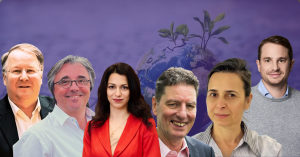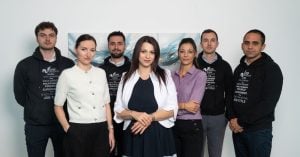A couple of years ago, the European Chamber of Commerce delegation in Singapore backed an initiative to explore how Central and Eastern European countries in the EU could engage more effectively with EU matters in Singapore. Krisitina Anguelova, currently an independent impact investor, senior advisor for sustainable finance, was brought on board to identify synergies between the region and Singapore, determine which sectors could benefit from stronger ties, and build a strategy around that.
The Recursive met with Kristina during this year’s Webit edition to discuss sustainability practices, green finance and climate tech opportunities.
“What began as a study quickly gained momentum, driven by both personal passion and widespread interest,” Kristina tells us about the initiative. “While I’m originally from Bulgaria, I grew up in South Africa and have lived in many different countries. I’ve seen firsthand how nationalities really support each other, and I felt that was missing when it came to visibility for that part of Europe in Singapore. I was eager to build a community on a business level to accelerate the success of these connections.”
Bridging the gap in achieving sustainability goals
Building bridges and adopting sustainability practices are crucial steps for every country. The Europe Sustainable Development Report 2023/24 (ESDR) shows that, at the current pace, the EU is on track to miss a third of its Sustainable Development Goals by 2030. The progress varies greatly between countries, with Northern and Western Europe missing about a quarter of the targets, while Southern and Central Eastern Europe – around half on average.
On the question whether sustainability practices should be adopted at the country or regional level, Anguelova clarifies: “I think that’s a really important question, and there’s no perfect answer. On some level, I believe things should be regional, and I think the CEE region shares a lot of challenges with regions like Southeast Asia or Asia in general, especially because some are still heavily dependent on coal and fossil gas, unlike most countries in Western Europe that rely more on nuclear energy or renewables.”
One of the initiatives Kristina worked on at WWF is the Transition Futures Credit in Asia, which is a financing instrument intended to make the closure of these plants more feasible. Asia accounts for a significant portion of global coal emissions, making it a key area for addressing climate change.
Key sustainability challenges for CEE
“The energy transition is crucial, but so is energy efficiency,” Anguelova explains as we delve into the pain points at the local level.
“Many of our buildings have yet to be retrofitted to achieve maximum energy efficiency. Additionally, water scarcity will be an issue. I’ve seen studies predicting that Hungary will face a significant risk of drought in the future. Just a few weeks ago, we saw the terrible floods in Budapest, which highlight how urgent these environmental challenges are,” she adds.
Anguelova also clarifies that while Central and Eastern Europe may not be as vulnerable and highly at risk as low-lying island nations and coastal areas, the region can still face significant environmental and economic challenges. Key areas for action include energy decarbonization, transitioning to renewables, and driving agricultural innovation to mitigate risks from droughts, floods, and other environmental threats.
“But what I’m particularly passionate about, and what I hope we can change in Bulgaria, is the financial system,” Kristina tells us.
“A good example from Central and Eastern Europe is Hungary, where their central bank is doing an excellent job aligning regulations with the EU Green Deal, the EU Taxonomy, and the Sustainable Finance Reporting (SFR) regulations. They’re making progress, and I believe Bulgaria needs to follow suit. Unfortunately, in Bulgaria, we haven’t seen much movement toward integrating ESG (Environmental, Social, and Governance) principles into the banking and investment sectors. This is a risk because globally, we’re moving toward standardized sustainability reporting, similar to how we do financial reporting,” explains Anguelova.
One thing is certain – Bulgaria must act to catch up. Properly communicating sustainability information is required to attract investments. “Investors want to see certain standards and frameworks, like green bonds that align with international capital market best practices such as the ICMA GBP (Green Bond Principles),” she adds.
Climate Tech Venture Capital Investments
How important are VC investments in green startups? “Very important,” says Anguelova as she notes that we are currently in need of tech solutions.
“That’s why I’m working with startups – because we need new ideas, new ways of thinking, and new ways of doing things. This is where technology comes in. It doesn’t matter whether it’s fintech, deep tech, climate tech, or other sectors; they’re all crucial.”
Kristina elaborates that venture capital investors are essential in driving innovation, partly because they operate with fewer regulatory constraints, allowing them to step into riskier opportunities, and even partially contribute through venture philanthropy. “Of course, VC investors also invest with the expectation of a return, but they play an important role in getting things off the ground, especially when it comes to patient capital,” she explains.
Anguelova highlights that patient capital is vital for launching innovative projects, as public funding from government sources is often limited. Traditional financial institutions also face constraints, particularly when it comes to investing in high-risk ventures at early stages. Therefore, VC investors play a key role in driving innovation and advancing these projects, providing the necessary funding to push them forward.
“I’m hoping we don’t lose focus on climate tech because it’s incredibly important. Perhaps we can leverage technologies like AI and quantum to help facilitate the commercial transition to a more sustainable economy,” concludes Anguelova.








